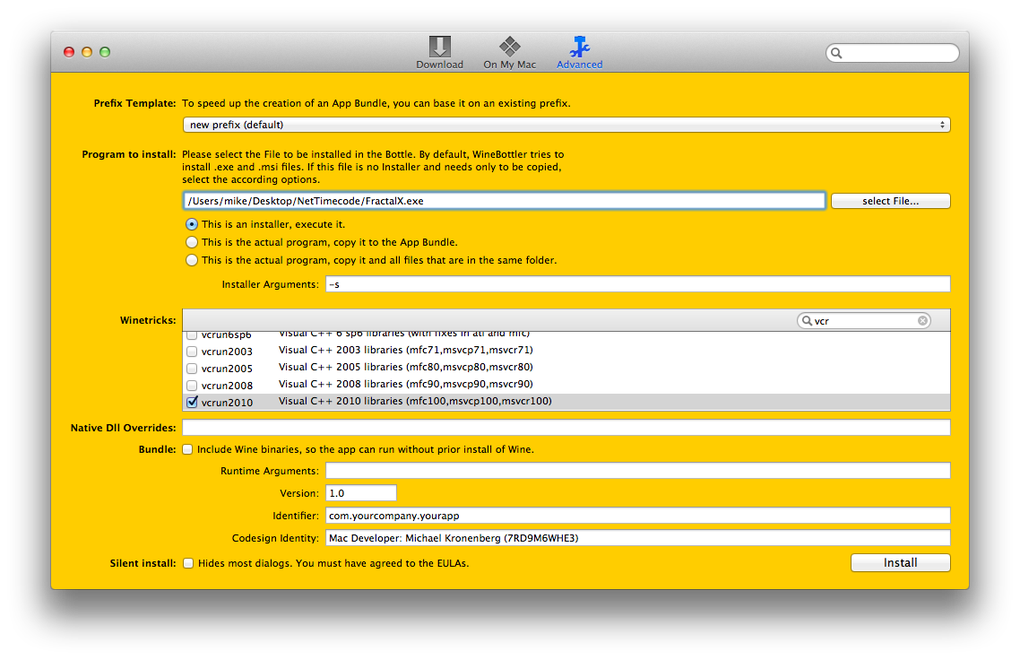

- #WINE FOR DARWIN AND MAC FOR MAC OS X#
- #WINE FOR DARWIN AND MAC INSTALL#
- #WINE FOR DARWIN AND MAC SOFTWARE#
Change in numbering scheme to match the Mac OS X build numbering scheme.Performance improvements to "boot time, real-time threads, thread management, cache flushing, and preemption handling".All releases of Cheetah (v10.0.0–4) had the same version of Darwin.Mac OS X Public Beta (code-named "Kodiak")
#WINE FOR DARWIN AND MAC FOR MAC OS X#

The following is a table of major Darwin releases with their dates of release and their corresponding macOS releases. It does, however, support a number of lesser-known features of macOS, such as mDNSResponder, which is the multicast DNS responder and a core component of the Bonjour networking technology, and launchd, an advanced service management framework. It supports the POSIX API by way of its BSD lineage (largely FreeBSD userland) and a large number of programs written for various other UNIX-like systems can be compiled on Darwin with no changes to the source code.ĭarwin does not include many of the defining elements of macOS, such as the Carbon and Cocoa APIs or the Quartz Compositor and Aqua user interface, and thus cannot run Mac applications. Older versions supported some or all of 32-bit PowerPC, 64-bit PowerPC, 32-bit x86, and 32-bit ARM. An open-source port of the XNU kernel also exists for ARM platforms. An open-source port of the XNU kernel exists that supports Darwin on Intel and AMD x86 platforms not officially supported by Apple, though it does not appear to have been updated since 2009.
#WINE FOR DARWIN AND MAC SOFTWARE#
Hardware and software supportĭarwin currently includes support for the 64-bit x86-64 variant of the Intel x86 processors used in Intel-based Macs and the 64-bit ARM processors used in the iPhone 5S and later, the 6th generation iPod Touch, the 7th generation iPad and later, the iPad Air family, the iPad Mini 2 and later, the iPad Pro family, the fourth generation and later Apple TVs, the HomePod family, and Macs with Apple silicon such as the 2020 Apple M1 Macs. The hybrid kernel design provides the flexibility of a microkernel and the performance of a monolithic kernel. The kernel of Darwin is XNU, a hybrid kernel which uses OSFMK 7.3 (Open Software Foundation Mach Kernel) from the OSF, various elements of FreeBSD (including the process model, network stack, and virtual file system), and an object-oriented device driver API called I/O Kit. Darwin is now only available as source code. Minor updates were released as packages that were installed separately.
#WINE FOR DARWIN AND MAC INSTALL#
Up to Darwin 8.0.1, Apple released a binary installer (as an ISO image) after each major Mac OS X release that allowed one to install Darwin on PowerPC and Intel x86 systems as a standalone operating system. In 2000, the core operating system components of Mac OS X were released as open-source software under the Apple Public Source License (APSL) as Darwin the higher-level components, such as the Cocoa and Carbon frameworks, remained closed-source. At the time, interim CEO Steve Jobs alluded to British naturalist Charles Darwin by announcing "because it's about evolution". In 1999, Apple announced it would release the Mach 2.5 microkernel, BSD Unix 4.4 OS, and the Apache Web server components of Mac OS X Server. This was developed into Rhapsody in 1997, Mac OS X Server 1.0 in 1999, Mac OS X Public Beta in 2000, and Mac OS X 10.0 in 2001. After Apple bought NeXT in 1997, it announced it would base its next operating system on OPENSTEP. The heritage of Darwin began with Unix derivatives supplemented by aspects of NeXT's NeXTSTEP operating system (later, since version 4.0, known as OPENSTEP), first released in 1989.


 0 kommentar(er)
0 kommentar(er)
